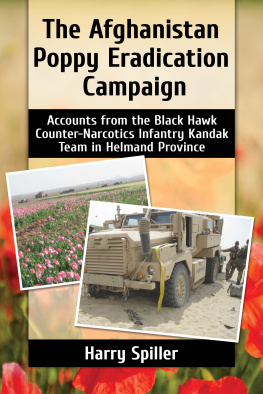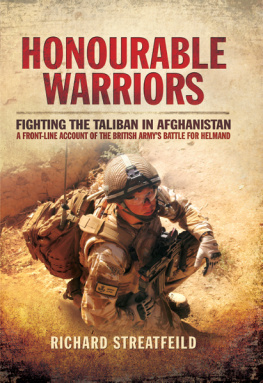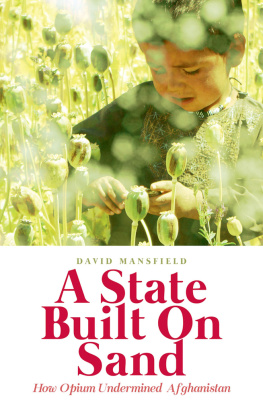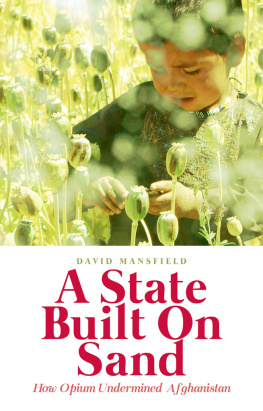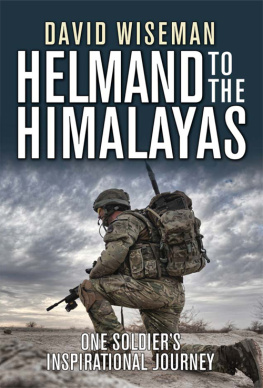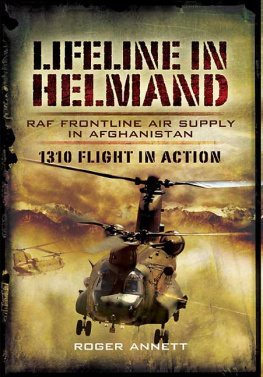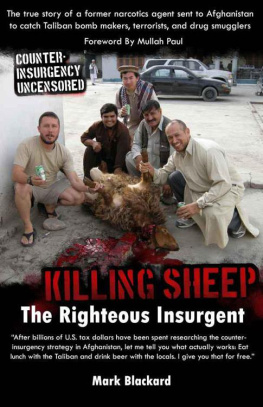
Also by OR EDITED BY HARRY SPILLER
AND FROM MCFARLAND
Veterans of Iraq and Afghanistan: Personal Accounts of 22 Americans Who Served (2014)
Support Programs for Ex-Offenders: A State-by-State Directory (2011)
American POWs in World War II: Twelve Personal Accounts of Captivity by Germany and Japan (2009)
Pearl Harbor Survivors: An Oral History of 24 Servicemen (2002)
Prisoners of Nazis: Accounts by American POWs in World War II (edited, 1998)
American POWs in Korea: Sixteen Personal Accounts (edited, 1998)
Scars of Vietnam: Personal Accounts by Veterans and Their Families (1994, softcover 2012)
Death Angel: A Vietnam Memoir of a Bearer of Death Messages to Families (1992, softcover 2012)
The Afghanistan Poppy Eradication Campaign
Accounts from the Black Hawk Counter-Narcotics Infantry Kandak Team in Helmand Province
HARRY SPILLER

McFarland & Company, Inc., Publishers
Jefferson, North Carolina
LIBRARY OF CONGRESS CATALOGUING DATA ARE AVAILABLE
BRITISH LIBRARY CATALOGUING DATA ARE AVAILABLE
e-ISBN: 978-1-4766-2810-3
2017 Harry Spiller. All rights reserved
No part of this book may be reproduced or transmitted in any form or by any means, electronic or mechanical, including photocopying or recording, or by any information storage and retrieval system, without permission in writing from the publisher.
Front cover photographs: Poppy field near Nad Ali; Pogue Mahone cougar hits IED (photographs by Greg Strong); background 2017 iStock
McFarland & Company, Inc., Publishers
Box 611, Jefferson, North Carolina 28640
www.mcfarlandpub.com
To all the men and women
of the Armed Forces and their families
who have served in Afghanistan
Acknowledgments
I would like to thank Major Greg Settle for providing the army records of Counter Narcotics Infantry Kandak Embedded Training Team (CNIK ETT) in Afghanistan during 2008 and 2009. I would also like to thank Kurt Merseal, Greg Settle, Jason Williams, Troy Kemper, Adam Cole, Kyle Campbell, Jeffery Sowash, James Russel, John Sury, Brian Mays, and Greg Strong for sharing their experiences from their poppy eradication mission in Helmand Province. In addition, I thank Jenifer Pritchard from the Williamson County Sheriffs Department for her research. Without their help, this book would not have been possible.
Introduction
Afghanistan is a mountainous, landlocked country located between Pakistan to the east and Iran to the west, with a population of roughly 30 million of the poorest, least educated, most battle-scarred people on Earth. It has been called the Graveyard of Empires because so many invading armies and would-be occupiers have foundered within its borders. In the 1980s the United States, Saudi Arabia, and Pakistan supported an insurgency in Afghanistan against a Soviet puppet government. As the Afghan government began to lose control of the provinces during the Soviet invasion of 19791980, warlords flourished, along with opium production as regional commanders searched for ways to generate money to purchase weapons. At this time the United States pursued an arms-length strategy of supporting the Afghan freedom fighters (or Mujahideen), the main purpose being to cripple the Soviet Union slowly into withdrawal through attrition rather than effecting a quick and decisive overthrow. The Soviets alleged on several occasions that American CIA agents were helping to smuggle opium out of Afghanistan, either into the West (in order to raise money for Afghan resistance) or into the Soviet Union (in order to weaken it through drug addiction). In 1989 the Soviets withdrew, and with that victory American interest in the country waned for a time.
When the Soviet Union was forced to withdraw from Afghanistan in 1989, a power vacuum was created. Various Mujahideen factions started fighting each other for power. With the discontinuation of Western support, they resorted more frequently to poppy cultivation to finance their military endeavors. Ultimately, one faction, the Taliban, seized control of Afghanistan.
In July 2000, Taliban leader Mullah Mohammed Omar, collaborating with the United Nations in an effort to eradicate heroin production in Afghanistan, declared that growing poppies was un-Islamic, resulting in one of the worlds most successful anti-drug campaigns. The Taliban enforced a ban on poppy farming via threats, forced eradication, and public punishment of transgressors. The result was a 99 percent reduction of opium poppy farming in Taliban-controlled areasroughly three-quarters of the worlds supply of heroin at the time. However, the ban was effective only for a short time due to the subsequent deposition of the Taliban following the terrorist attacks of 9/11 and the U.S. invasion of Afghanistan.
Some individuals believe that certain parties benefited from the price increase of heroin during the ban, even going so far as to argue that it was a form of market manipulation on the part of certain drug lords. Dried opium, unlike most agricultural products, can easily be stored for long periods without refrigeration or other expensive equipment. With huge stashes of opium stored in secret hideaways, the Taliban and other groups that became involved in the drug trade were able to reap huge personal profits during the price spikes after the 2000 ban and the chaos of 9/11.
Afghanistan has been the greatest illicit opium producer in the entire world, ahead of the Golden Triangle (i.e., the shared border area between Myanmar, Laos, and Thailand) and Latin America since 1992. Opium production has been on the rise since U.S. occupation of Afghanistan started in 2001. Based on United Nations Office on Drugs and Crime (UNODC) data, there has been significant opium poppy cultivation in each of four growing seasons during 20042007.
In 2007, 92 percent of the non-pharmaceutical-grade opiates on the world market originated in Afghanistan. This amounts to an export value of $4 billion, a quarter of which is earned by opium farmers, with the rest going to district officials, insurgents, warlords, and drug traffickers. In the seven years prior to the Taliban opium ban in 2000, the Afghan farmers share of gross income from opium was divided among 200,000 families. In addition to opiates, Afghanistan is the largest producer of cannabis in the world.
The United States, in conjunction with the Afghanistan National Armys Counter Narcotics Infantry Kandak (ANA CNIK), began to conduct joint operations of poppy eradication in the country. In April 2009, the Illinois Army National Guard, 2nd Battalion, 130th Infantry Regiment, 33rd Infantry Brigade Combat Team (consisting of sixteen soldiers), was mobilized and deployed to Afghanistan as the Counter Narcotics Infantry Kandak Embedded Training Team (CNIK ETT). The sixteen-man team, along with ANA CNIK, the Afghanistan National Polices Poppy Eradication Force and DynCorp Internationals Poppy Eradication Force, was assigned to Helmand Province with plans to eradicate poppy cultivation and support the national goals for reducing illicit crop production.
The CNIK ETT was involved in more than one hundred combat operations over the course of the teams deployment. During the seventy-five days in which they operated in Helmand, forty operations were directly related to the eradication mission. Thirty-one of those operations involved direct engagements with enemy forces for more than fifty continuous hours of fighting. Typical engagements by the enemy were with AK-47s, RPGs, PKMs and 82mm mortars. Several assaults included 107mm rockets and a ZSU-23 anti-aircraft gun. In addition to the many rocket attacks on the force while conducting the eradication missions, 10 rockets and an unknown number of mortars were fired on Forward Observation Base (FOB) Eagle. The team successfully detected 4 improvised explosive devices (IEDs) that were neutralized by the DynCorp Explosive Ordnance Disposal (EOD) team. They also experienced one IED strike with no casualties or injuries.
Next page
